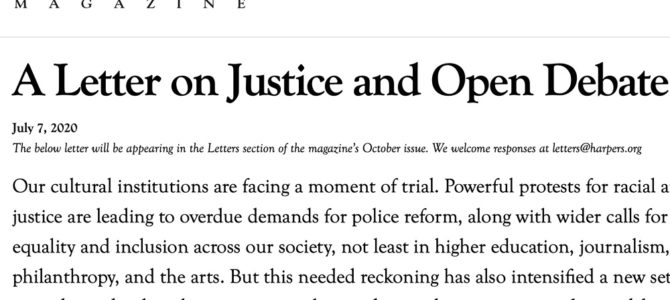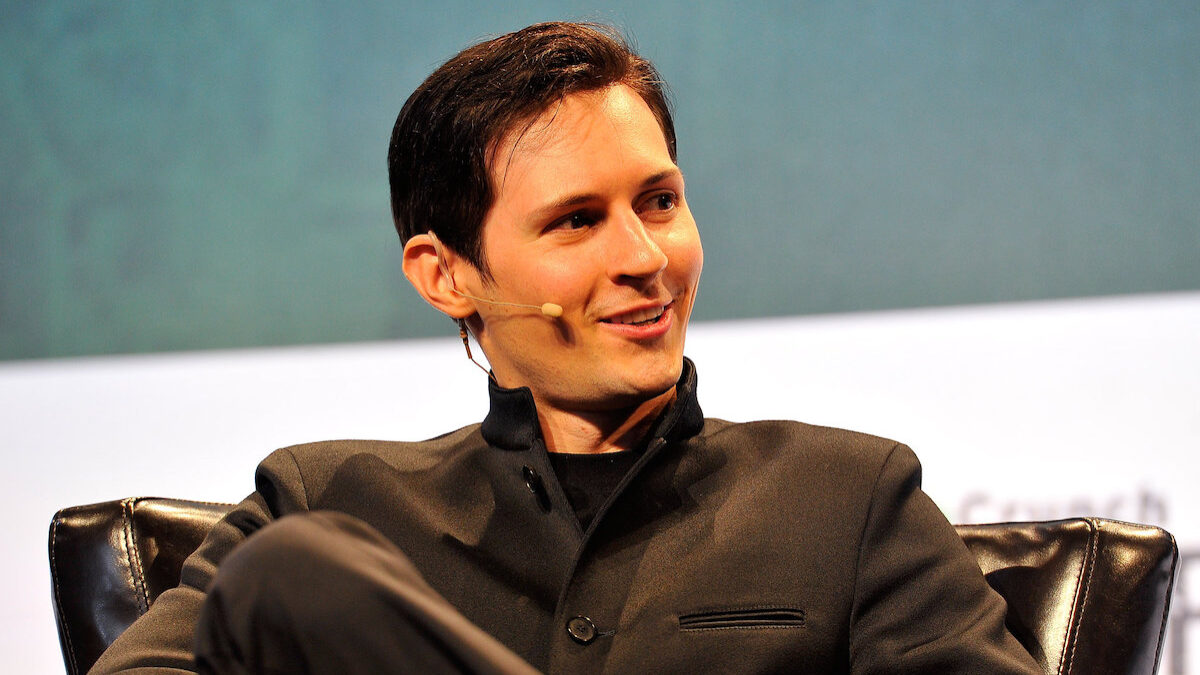
A list of 150 elites in academia and media signed their names to an eminently reasonable “Letter on Justice and Open Debate” published Tuesday by Harper’s. While signatories’ politics vary wildly, ranging from Noam Chomsky to David Frum, they share membership in our class of educated elites. The letter is consequently as imperfect and preening as those elites tend to be, but at least marked a positive development amid this prolonged and bitter battle in the broader culture war—that is, until the backlash began.
At times eloquent and firm, the letter reflects neoliberal blindspots that clearly informed its author(s), who go on about having come to “expect” censoriousness from the “radical right.” (The radical left, of course, has no long track record of throwing pies in the face of, say, Phyllis Schlafly.) But it’s still a fairly brave rebuke of the far-left’s escalating war on essential values, values we once shared that seem to have fallen out of fashion in the corridors haunted by these elites. So I’ll take it.
It is unquestionably positive, for instance, to see a robust group of powerful people affirm their commitment to a sentiment as important as this:
The way to defeat bad ideas is by exposure, argument, and persuasion, not by trying to silence or wish them away. We refuse any false choice between justice and freedom, which cannot exist without each other. As writers we need a culture that leaves us room for experimentation, risk taking, and even mistakes. We need to preserve the possibility of good-faith disagreement without dire professional consequences.
It’s not a sentiment that would have stirred controversy in major newsrooms or boardrooms just a few years ago. That is itself a frightening statement on the status of this debate, which is desperate, even dire. These are bedrock principles without which the freest and fairest society to have ever graced Planet Earth will cease to exist as we know it. This affirmation from Gloria Steinem and Noam Chomsky and Margaret Atwood and J.K. Rowling and Fareed Zakaria and Matthew Yglesias, imperfect as it may be, is good.
Speaking of Yglesias, some of the writer’s colleagues at Vox Media are less than pleased with his decision to support such violent ideas as “open debate,” and aired their displeasure publicly. The complaint seemed to be Yglesias’s co-signers, referred to by an Eater editor as “the most malignant figures in journalism.” Another of his colleagues complained to Vox editors that Yglesias’s decision “makes me feel less safe at Vox.”
“A lot of debates that sell themselves as being about free speech are actually about power. And there’s *a lot* of power in being able to claim, and hold, the mantle of free speech defender,” Ezra Klein, Yglesias’s co-founder, tweeted on Wednesday.
Jesse Singal, one of the letter’s signatories, documented much of the backlash in a piece for Reason. Much of the left-on-left infighting seems to come down to the letter’s “anti-trans” signers, which is maddening given that our conversation about transgenderism is the case-in-point on the critical importance of open debate. With children’s well-being on the line, new conceptions of sex and gender must be able to undergo good-faith scrutiny, something Singal takes constant flack for undertaking.
A HuffPost director said he declined to sign declined to sign because the letter amounted to “trolling.” Robert Reich declined “because Trumpism, racism, xenophobia, and sexism have had such free rein and baleful influence in recent years that we should honor and respect the expressions of anger and heartache finally being heard.” At least two signatories have retracted their names.
Some observers mocked the letter as a claim to victimhood from people who have no right to it, people with major platforms complaining about restrictions at major platforms. This criticism fails for two reasons, the first of which is that nearly every single writer and thinker whose name is attached to list has self-censored beyond healthy boundaries in recent years, fearful of backlash.
The second is that the letter is a warning. While it does describe the “stifling atmosphere” of today, it also argues such an atmosphere “will ultimately harm the most vital causes of our time.”
The backlash raises the question of whether that battle is already over, and we’re gradually exiting the precious American era of “open debate,” something made possible by our remarkable founding documents, with positive consequences reaped everywhere, from academia to pop culture, benefitting the left and right alike. Is there even meaningful agreement among the signatories?
The case of Sen. Tom Cotton makes for a helpful litmus test. Attached to the Harper’s letter is the signature of New York Times columnist Michelle Goldberg. The letter references Cotton, lamenting that “Editors are fired for running controversial pieces,” which is what happened when a Times staffer complained about the paper’s decision to run an op-ed on recent riots from the Arkansas Republican, arguing it posed a safety risk to their black colleagues.
Goldberg agreed. “The danger my colleagues have tweeted about is real,” she wrote in a column, reflecting, “as I’ve seen my colleagues’ anguished reaction, I’ve started to doubt my debating-club approach to the question of when to air proto-fascist opinions.” Note how she describes mainstream conservative opinion as “proto-fascist.” That’s really the heart of the problem. To restore elite agreement on open debate, we need to restore elite agreement on key definitions, whether it’s fascist or racist or white supremacist.
Ultimately Goldberg punted, framing the question as a difficult one at the heart of the country’s recent struggles, rather than providing an answer. “It’s important to understand what the people around the president are thinking. But if they’re honest about what they’re thinking, it’s usually too disgusting to engage with,” she concluded. “This creates a crisis for traditional understandings of how the so-called marketplace of ideas functions.”
Goldberg may not agree with the forced resignation of the paper’s opinion editor over the incident and was, perhaps, genuinely conflicted over publishing Cotton. But, in practice, she seems hesitant to actually defend the principles she signed onto in the letter. Given the backlash, I suspect she’s not alone.
That’s likely why conservatives may be more inclined to roll their eyes at the letter than applaud it—many of the signatories fueled the problem they’re now proudly attempting to solve. When push comes to shove, their commitment to its principles is also questionable. If, however, after the dust settles and the pressure subsides, only two names are dropped from the list, this letter could reasonably be more bulwark than death rattle.









